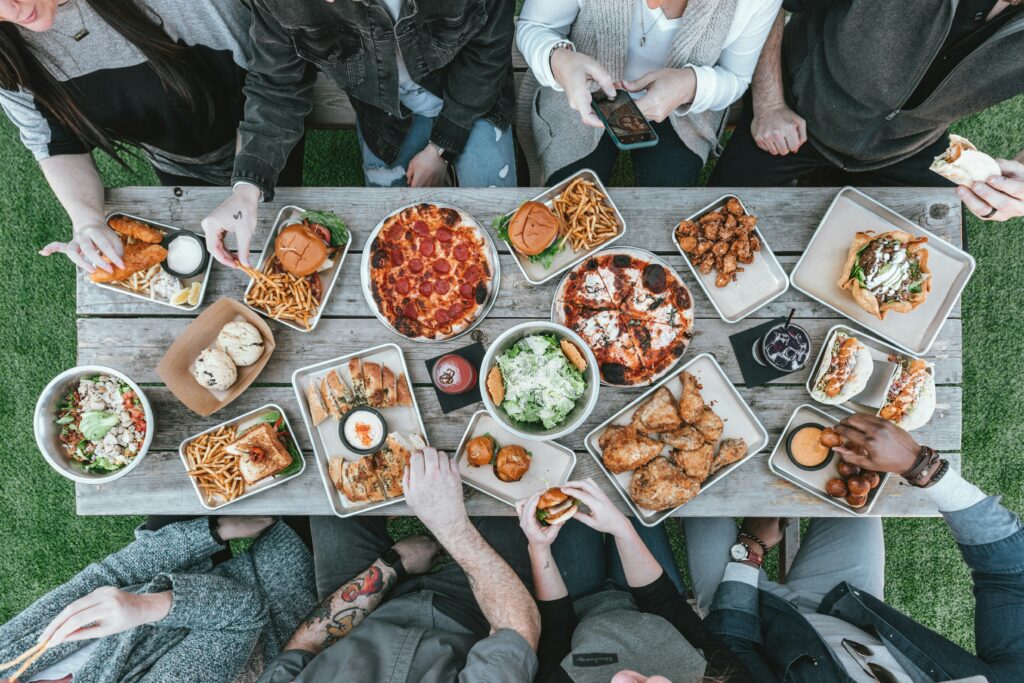Stonecoast Review
The Literary Journal of the Stonecoast MFA
Sixteen Steps to Eating a Potato

By Shawna Ervin
1
Choose a tray—red, orange, green, or blue. Notice the scratches. Grab a plastic plate, a napkin, silverware still warm.
2
Notice the leaves on trees outside are turning similar oranges and reds. Consider going on a walk later to find a tree, throwing leaves over your head. Imagine leaping into a leaf pile, letting it cover all but your face. Consider inviting someone. Decide against it.
3
Hold up one finger or two at each station. Watch women in hairnets drop canned pears and a beef patty on your plate. When you come to potatoes lined up like silver soldiers under a red light, watch students ahead of you peel the foil off and drop it in a black trash can. See students flinch at the heat of the potato, stab butter knives into the tough skin, pinch and squeeze.
4
Try not to remember weekends as a child when the food that came in boxes ran out. Try not to remember the burning in your stomach, the dizziness, waking on the floor of your closet while getting dressed for church. Try not to remember the pain in your hips, your shoulders, your back as you tried to sleep, the sound of cockroaches in empty cabinets, across plates and the tile floor.
5
Follow students to the line for toppings. Watch them poke at the congealed sauce, ladle cheese over their potatoes, sprinkle bacon, broccoli onto their plates. Think about how it reminds you of history videos, bombs gently released by fighter planes, then landing in smoke and rubble.
6
When your stomach grumbles before each meal, ignore it. You have not learned hunger’s signs yet.
7
Veer away from students at the beverage area. Grab a yellow-tinted plastic cup. Let your fingers slide over the texture. Remember Sunday nights after church at breakfast restaurants, lipstick left on cups like this, carpet seams covered in worn duct tape. Remember flickering lights, the smell of cigarette smoke on the waitresses, stains on their pink aprons.
8
When someone bumps into you in the cafeteria, grab your tray and plate like you are protecting a small child. Back away.
9
In a break between two soda lines, push forward to the white milk. Fill your cup, drink, fill it again.
10
Don’t let yourself think the word “ravenous.”
11
Sit at a table with others from your dorm and your classes. While other students sip, and talk, mix the sauce and potato and broccoli on your plate, eat. When the ache of hunger disappears, eat more. When your stomach pushes against the pants you wear that are a child’s size, keep eating. Even when students at your table say your name, when they ask about an assignment for calculus or German, when they complain about the cheese sauce, the stiffness of the broccoli, keep eating.
12
Only when your plate is empty, when the cheese sauce is sopped up with a dry potato skin, sit back and listen. When your plate is empty, finish the milk.
13
When your feet grow, when you outgrow your clothes, add more cheese to your potato, drink more milk.
14
Remember the contents of the charity food boxes—tuna and Spam, a coupon for day-old ground beef, canned fruit and vegetables, a block of government cheese, packages of pasta and rice.
15
Stop by the fruit baskets at meals. Try an orange, a banana, a plum, a pear. Wonder how you missed these before, missed the skin breaking under your teeth, the juice on your chin. Try asparagus and ham and fried chicken. Try fresh carrots and celery, ranch dressing, cream cheese. Let food float in your mouth. Identify salt, sugar, oil, fresh.
16
Choose chocolate milk instead of white, a green apple instead of a red one. Choose raspberries instead of blueberries, eggs instead of sausage. Slow down. Say you understand the math assignment for tomorrow, make a joke in German. Pat your soft belly, ask someone if they want to go on a walk after your next class. Try not to act surprised when they say yes. Turn your head when you hear your name. Feel your cheeks lift into a smile.
SHAWNA ERVIN has an MFA from Rainier Writers Workshop through Pacific Lutheran University in Washington state. She is a poetry reader for Adroit Journal and on the faculty of the Tupelo Press Teen Writing Center. She was a member of Tin House’s 2023 and 2024 Winter Online Workshops as well as Kenyon Review’s 2023 Workshop for Teachers Online. She was a finalist for Kenyon Review’s 2024 Developmental Editing Fellowship.
Recent publications include poetry in American Literary Review, Bangalore Review, Cagibi, Synkroniciti, and Rappahannock Review; and prose in Blue Mesa Review, Sonora Review, Sweet: A Literary Confection, and elsewhere. Her chapbook Mother Lines was published by Finishing Line Press. Shawna was a finalist in Ruminate’s 2021 flash essay contest and a semi-finalist in their 2022 poetry contest.
This story originally appeared in Stonecoast Review Issue 21.
Photo by Spencer Davis
